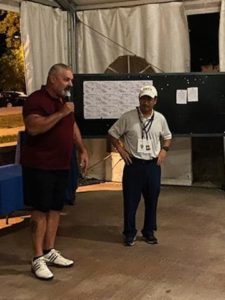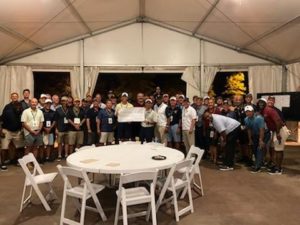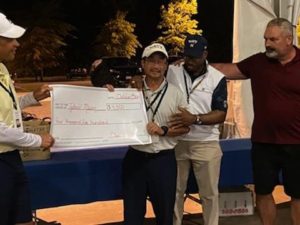CONGRATULATIONS to the 2022 BDSRA Australia Research Grant Winners!
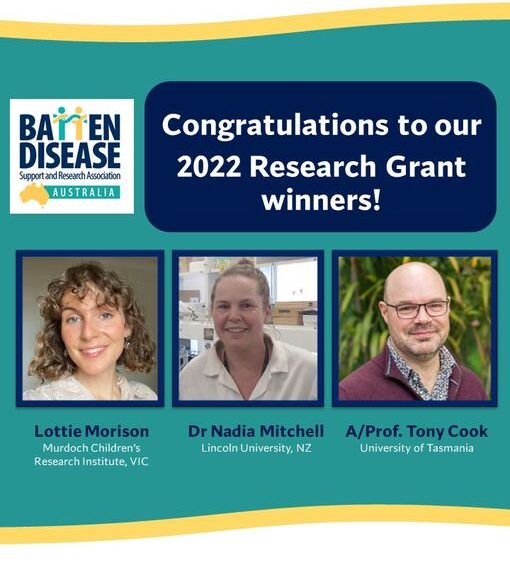
BBDF & BDSRA Australia are pleased to announce the winners of this year’s Research Grant round, with a total of over $120,000 awarded to three projects.
Congratulations to chief investigators Lottie Morison from the Murdoch Children’s Research Institute who has been awarded $13,950 for work in characterizing speech and language deficits in Batten disease; Dr. Nadia Mitchell from Lincoln University NZ awarded $54,545 for her continued work in CLN5 and CLN6 gene therapy; and Assoc. Professor Tony Cook from the University of Tasmania was awarded $53,612 for his continued work in CLN3 stem cell models.
The Beyond Batten Disease Foundation is a proud partner to co-fund Prof. Cook’s grant this year.
BBDF Sponsors BDSRA Australia’s 2022 Family Retreat
BBDF Sponsors NCL Congress
Thank you NCL Congress for allowing BBDF to be a sponsor this year as they gathered families, scientists, and industry experts to discuss gaps, lessons learned, and emerging therapeutic approaches in NCL preclinical and clinical research.
Theranexus and BBDF Finalize Recruitment For Phase I/II Trial to Evaluate Batten-1 in Batten Disease
Lyon, France – Austin, Texas, United States – 6 September 2022 – 6 pm CEST – Theranexus, a biopharmaceutical company innovating in the treatment of neurological diseases and pioneer in the development of drug candidates modulating the interaction between neurons and glial cells, and the Beyond Batten Disease Foundation (BBDF), have today announced finalization of recruitment of the last patient for the Phase I/II clinical trial to evaluate the tolerability, pharmacokinetics of the Batten-1 drug candidate in juvenile (CLN3) Batten disease.
A total of six patients with juvenile Batten disease aged 17 and over are enrolled in the Phase I/II clinical trial. The Batten-1 drug candidate containing the active ingredient miglustat is administered in escalating doses. The initial tolerability and pharmacokinetic data for miglustat obtained after the first 9 weeks of treatment in this population will serve to initiate Phase III, and Phase I/II patients are being treated and evaluated over a 24-month period.
Franck Mouthon, Chairman of Theranexus, said: “Finalization of recruitment for our Phase I/II trial is an important milestone in the development of Batten-1, a drug candidate that aims to significantly slow progression of juvenile Batten disease for which there is currently no available treatment. Our goal for the next stages in the development process is to launch an international pivotal Phase II/III trial in 2023.”
Craig Benson, Chair of the Beyond Batten Disease Foundation, added: “As parents and representatives of patients with juvenile Batten disease and their families, we are delighted with the enrollment of the last patient in the Phase I/II trial. This new Batten-1 treatment offers tremendous hope for our children affected by the disease.”
The Phase I/II trial is being conducted by referral centers for Batten disease in the United States, with Dr. Gary Clark, Chief of Child Neurology at Texas Children’s Hospital in Houston, as principal investigator.
About Batten-1
Batten-1 is a novel and exclusive proprietary drug containing the active ingredient miglustat. The mechanism of action of this substance blocks the accumulation of glycosphingolipids and neuroinflammation to prevent brain cell death. In the Phase I/II trial, Batten-1 is administered to patients over 17 years of age in solid form, and in Phase III it will be administered in a liquid form better suited to children.
About Batten disease
Juvenile Batten disease, also known as Spielmeyer-Vogt or CLN3 disease, is a rare, fatal, inherited disorder of the nervous system for which there is no treatment or cure. Juvenile Batten disease belongs to a group of disorders referred to as neuronal ceroid lipofuscinoses (NCLs). Over 400 different errors in 13 genes have been attributed to various forms of NCL, which differ from one another primarily by when symptoms first appear. The first symptom in the juvenile form, progressive vision loss, appears between the ages of 4 and 6 which is followed by personality changes, behavioral problems, and slowed learning. Seizures commonly appear within 2-4 years of the onset of disease. Over time, patients continue to decline mentally and physically. Eventually, those affected become wheelchair-bound, are bedridden, and die prematurely. Psychiatric symptoms or psychosis can appear at any time.
Juvenile Batten disease is always fatal; usually by the late teens to early 20s. In the United States and Europe, the juvenile form is the most common of the NCLs, which together, affect nearly 3,000 patients. In pathophysiological terms, interactions between neurons and glial cells play key roles in the emergence and progression of all the NCLs.
About Beyond Batten Disease Foundation
Beyond Batten Disease Foundation (BBDF) is the world’s largest nonprofit organization dedicated to funding research for a treatment and cure for juvenile (CLN3) Batten disease. Since its inception in 2008, over $35 million has been invested in research by leveraging donations, co-funding and strategic partnerships. BBDF is spearheading a unique, cohesive strategy, incorporating independent scientific resources and collaboration with related organizations to drive research in juvenile Batten Disease . Today there is a treatment in sight. BBDF funded research has discovered a drug – Batten-1 – that slows the progression of the disease in Batten models. More information can be found at www.beyondbatten.org
About Theranexus
Theranexus is an innovative biopharmaceutical company that emerged from the French Alternative Energies and Atomic Energy Commission (CEA). It specializes in the treatment of central nervous system disorders and is a pioneer in the development of drug candidates targeting both neurons and glial cells.
The company has a unique platform for the identification and characterization of advanced therapy drug candidates targeting rare neurological disorders and an initial drug candidate in clinical development for Batten disease.
Theranexus is listed on the Euronext Growth market in Paris (FR0013286259- ALTHX).
Next financial publication:
Tuesday 27 September 2022: First half 2022 financial results
More information at http://www.theranexus.com
Contacts
THERANEXUS
Thierry Lambert
Chief Financial Officer
contact@theranexus.com
NEWCAP
Théo Martin/Pierre Laurent
Investor Relations
+33 (0)1 44 71 94 97
theranexus@newcap.eu
FP2COM
Florence Portejoie
Media Relations
+ 33 (0)6 07 76 82 83
fportejoie@fp2com.fr
Disclaimer
This press release contains certain forward-looking statements concerning Theranexus and its business, including its prospects and product candidate development. Such forward-looking statements are based on assumptions that Theranexus considers to be reasonable. However, there can be no assurance that the estimates contained in such forward-looking statements will be verified, which estimates are subject to numerous risks including the risks set forth in the universal registration document of Theranexus filed with the AMF on 28 April 2021 under number D.21-0379 (a copy of which is available on www.theranexus.com) and to the development of economic conditions, financial markets and the markets in which Theranexus operates. The forward-looking statements contained in this press release are also subject to risks not yet known to Theranexus or not currently considered material by Theranexus. The occurrence of all or part of such risks could cause actual results, financial conditions, performance or achievements of Theranexus to be materially different from such forward-looking statements. Theranexus expressly declines any obligation to update such forward-looking statements.
[1] National Organization for Rare Disorders (NORD)/Orphanet
[2] Settembre et al, TFEB links autophagy to lysosomal biogenesis, Science 2011
Craig Benson Interview with KHN
BBDF Co-Founder and Board Chair Craig Benson was interviewed by Kaiser Health News for a story focused on family foundations taking greater control in drug development. The article shares some of the challenges faced by rare disease groups and highlights organizations, like BBDF, who are overcoming those obstacles.
BBDF 101 Update
BBDF 101 Update
Theranexus announced yesterday that it is now, more than ever, committed to support patients with rare neurological disorders by focusing all its research efforts on these diseases, starting with CLN3. In this context, the project with Beyond Batten Disease Foundation (BBDF) becomes their flagship project and they have decided to dedicate all resources and efforts to make this project a success to benefit of the CLN3 disease community. Following the initiation of the ongoing Phase l/ll clinical study involving 6 young adult patients, Theranexus and BBDF are in the process of finalizing discussions with the FDA to initiate Phase III.
BBDF-101 PHASE I/II TRIAL UNDERWAY
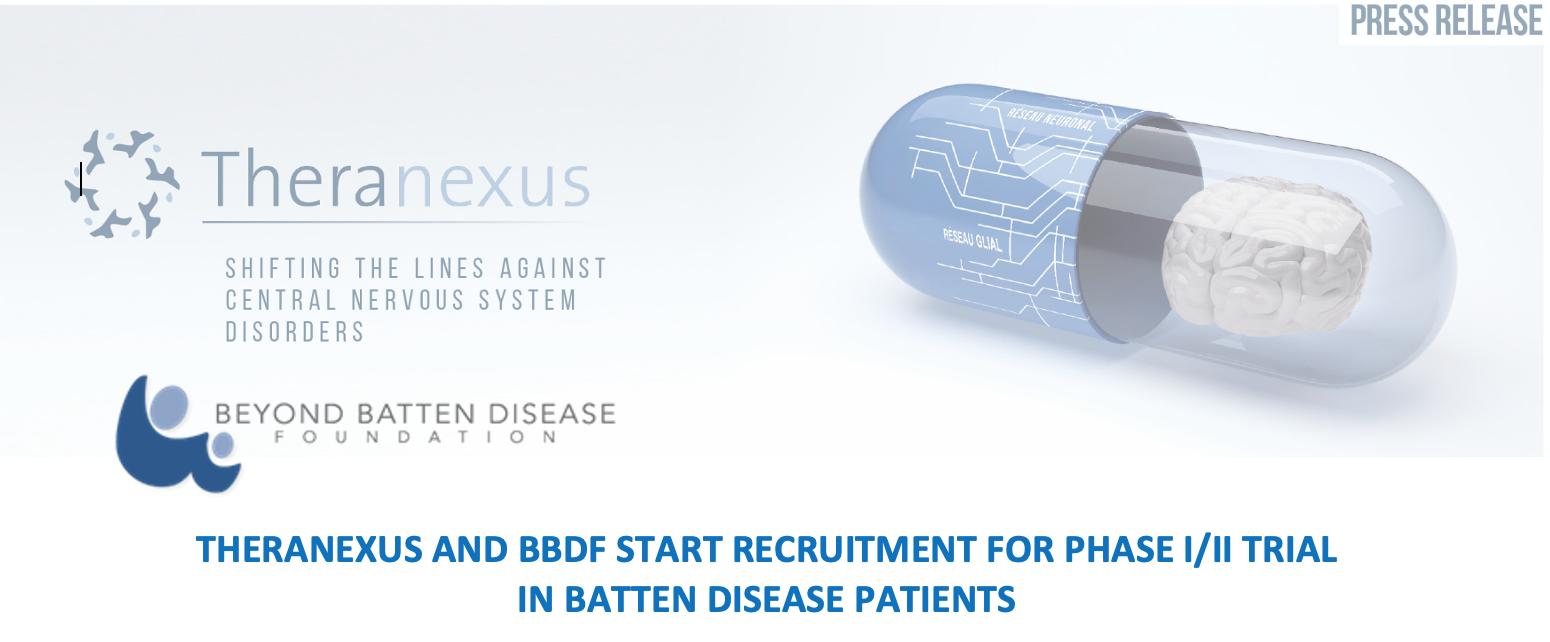
Lyon, France – Austin, TX, USA – 3 February 2022 – Theranexus, a biopharmaceutical company innovating in the treatment of neurological diseases and pioneer in the development of drug candidates modulating the interaction between neurons and glial cells, and the Beyond Batten Disease Foundation (BBDF), are starting recruitment for Phase I/II clinical trial to evaluate BBDF-101 in Batten disease.
Franck Mouthon, Chairman of Theranexus, said: “The launch of recruitment is a key step in the development of our drug candidate BBDF-101. This trial will be conducted with BBDF and in collaboration with leading North American referral centers for Batten Disease, a rare, fatal, genetic disorder of the nervous system. Our ambition is to demonstrate the full potential of BBDF-101 in this disease for which there are currently no therapeutic options for patients.”
Following on from the award of Investigational New Drug (IND) approval from the Food and Drug Administration (FDA) for its BBDF-101 program in 2021, Theranexus is now actively recruiting patients for its Phase I/II clinical trial. During the 2-year trial, six patients 17-year-old or older will receive BBDF-101 in escalating doses during the first 4.5 months to establish tolerability and pharmacokinetics of trehalose, miglustat and a combination of trehalose/miglustat. The results of the titration phase will be available at the start of the second half of 2022.
After consulting with the FDA, at the end of 2022 Theranexus plans to start a pivotal Phase III trial involving a pediatric cohort of 30 patients with regular measurements to assess disease progression and safety. The aim will be to compare the development of various signs and symptoms in these patients, as rated on the Unified Batten Disease Rating Scale (UBDRS, neurological and behavioral symptoms, activities of daily living, etc.), over a period of two years, to data from a study of disease progression in a cohort of untreated patients followed for many years at the University of Rochester.
This Phase III trial will be conducted in collaboration with the leading referral centers for Batten disease in the United States which include the Texas Children’s Hospital in Houston, TX, the fourth largest pediatric hospital in the United States, the National Institutes of Health, and the University of Rochester Batten Center in Rochester, NY.
“It is with great gratitude for our patients’ families and donors that we now see the launch of the BBDF-101 clinical program which aims to offer a therapeutic solution for patients suffering from this very rare genetic disease. Achieving this major milestone for the Foundation, in collaboration with Theranexus, is an exciting culmination of almost 12 years of research,” concludes Craig Benson, Chair of the BBDF Board of Directors.
About Batten disease
Juvenile Batten disease, also known as Spielmeyer-Vogt or CLN3 disease, is a rare, fatal, inherited disorder of the nervous system for which there is no treatment or cure. Juvenile Batten disease belongs to a group of disorders referred to as neuronal ceroid lipofuscinoses (NCLs). Over 400 different errors in 13 genes have been attributed to various forms of NCL, which differ from one another primarily by when symptoms first appear. The first symptom in the juvenile form, progressive vision loss, appears between the ages of 4 and 6 which is followed by personality changes, behavioral problems, and slowed learning. Seizures commonly appear within 2-4 years of the onset of disease. Over time, patients continue to decline mentally and physically. Eventually, those affected become wheelchair-bound, are bedridden, and die prematurely. Psychiatric symptoms or psychosis can appear at any time. Juvenile Batten disease is always fatal; usually by the late teens to early 20s. In the United States and Europe, the juvenile form is the most common of the NCLs, which together, affect nearly 3,000 patients[1] In pathophysiological terms, interactions between neurons and glial cells play key roles in the emergence and progression of all the NCLs.
About Beyond Batten Disease Foundation
Beyond Batten Disease Foundation (BBDF) is the world’s largest nonprofit organization dedicated to funding research for a treatment and cure for juvenile (CLN3) Batten disease. Since its inception in 2008, over $35 million has been invested in research by leveraging donations, co-funding and strategic partnerships. BBDF is spearheading a unique, cohesive strategy, incorporating independent scientific resources and collaboration with related organizations to drive research in juvenile Batten Disease[2]. Today there is a treatment in sight. BBDF funded research has discovered a drug that slows the progression of the disease in Batten models. More information can be found at www.beyondbatten.org
About development of BBDF-101 for Batten disease and the partnership between BBDF and Theranexus
The research funded by BBDF and conducted by academics specializing in lysosomal storage disorders (particularly Baylor College of Medicine) led to the discovery of the drug candidate BBDF-101. Following a partnership agreement between BBDF and Theranexus concluded in late 2019 (see below), Theranexus supplemented preclinical development of BBDF-101 with research to establish product safety. Thanks to the research findings, BBDF-101 will now be able to enter the clinical phase following the grant of IND status by the FDA in September 2021.
The clinical development pathway includes:
- Phase I/II for which recruitment began today,
- Phase III due to start by the end of 2022 and to include 30 patients with the aim of achieving final results in the second half of 2025,
The development of BBDF-101 is the result of a partnership concluded between BBDF and Theranexus in late 2019. The exclusive, global license agreement between BBDF and Theranexus covers the clinical development of drug candidate BBDF-101 pending approval and its commercial use. Theranexus also plans to continue its research on the NeuroLead platform of drug candidates targeting neurological forms of other lysosomal disorders.
In consideration for this license, the agreement provides for Theranexus to pay BBDF fixed sums on signing, approval, and achievement of commercial objectives post-approval. Moreover, the agreement provides for payment of royalties calculated based on net sales of BBDF-101 once it is marketed by Theranexus
| ABOUT THERANEXUS Theranexus is a clinical-stage biopharmaceutical company that emerged from the French Alternative Energies and Atomic Energy Commission (CEA) in 2013. It develops drug candidates for the treatment of nervous system diseases. Thanks to its knowledge of neuron and glial cell interactions, THERANEXUS is a pioneer in the design and combination of approved substances and has a solid and diversified portfolio of drug candidates in clinical-phase testing. The company’s combined drug repurposing strategy based on a solid commercial footing and a capability to rapidly demonstrate its clinical worth, enables it to produce different high-value-added proprietary drug candidates, significantly reduce development time and costs, and considerably increase the chance of its drugs reaching the market. Accordingly, THERANEXUS is well-positioned in several indications, including for Parkinson’s and Batten disease, for which there is currently no treatment available. Theranexus is listed on the Euronext Growth market in Paris (FR0013286259- ALTHX). More information on: http://www.theranexus.com Click and follow us on Twitter and Linkedln Contacts THERANEXUS Thierry LAMBERT Financial and Administrative Director investisseurs@theranexus.fr
NEWCAP Théo MARTIN/Pierre LAURENT Relations Investisseurs +33 (0)1 44 71 94 97 theranexus@newcap.eu
FP2COM Florence PORTEJOIE Media Relations + 33 (0)6 07 76 82 83 fportejoie@fp2com.fr |
[1] National Organization for Rare Disorders (NORD)/Orphanet
[2] Settembre et al, TFEB links autophagy to lysosomal biogenesis, Science 2011
Foundation Helps Sponsor Drafting of Guidelines for Juvenile Batten

The Beyond Batten Disease Foundation (BBDF) is sponsoring Care Beyond Diagnosis in its efforts to draft international guidelines to help clinicians counsel and treat patients with CLN3 disease, or juvenile Batten disease.
Based on clinical evidence and consensus-based recommendations, the guidelines are designed to improve patient care and disease management, as well as facilitate reimbursements.
“Having the support of BBDF is a huge achievement for our team,” Jeffrey Donohue, co-CEO of Care Beyond Diagnosis, said in a press release. “Obviously, the financial commitment is important for us to keep the program going, but looking ahead towards the publication of the guidelines, BBDF will be instrumental in dissemination of the guidelines into family/caregivers’ hands. Engagement from the patient community is a necessity in guideline development.”
Read the full article here.
USNA Class of 1986 Fundraiser for Tyler’s Mission
USNA Class of 1986 Fundraiser for Tyler’s Mission
The weekend of 7-10 October marked the 35th Reunion for the Naval Academy Class of 1986. The first event of the weekend was a golf outing at Compass Pointe Golf Course in Pasadena, MD. Seventy-seven classmates gathered to play golf and swap seas stories. But more importantly, the occasion was an opportunity to give back to a classmate in need. Through the selling of various on course items (mulligans, 2′ of string, opportunity to tee off from the fairway on one hole), and a raffle event after the tournament featuring items donated by classmates and local businesses, the Class raised $4862 for Tyler’s Mission in support of the son on classmate Jim Kim. It was a perfect ending to a perfect day. The Class could not be more inspired by the way Tyler lives his life and was honored to make this donation to his fund. Go Tyler! Beat Batten!
